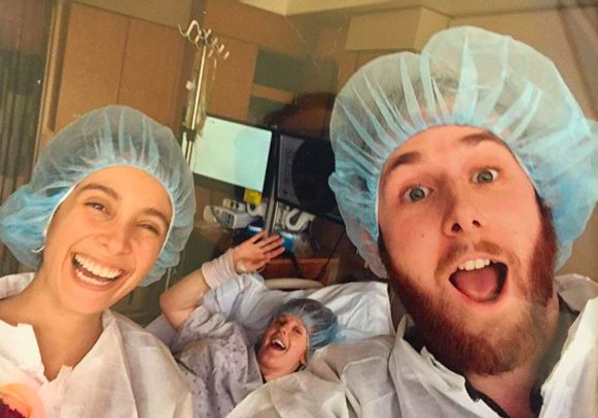Allie: What drew you to specifically being a doula?
Kim: The biggest thing is wanting to help women feel empowered by their birth experience. That’s really, what it is. And also, back to the idea of community and support. It doesn’t exist in our culture anymore, but if you think back to when we were living in tribes, it was just built in. You’d have your family and other people helping with care – even breast feeding each other’s children. Now, we’re super isolated. Depression and anxiety for Americans is one of the biggest issue of our time. I think we’re more isolated than we’ve ever been.
Allie: We at MHT are talking about the power of recognition: what it means to be seen, acknowledged, and recognized. What have you learned about recognition from witnessing that first moment between a mom and her baby?
Kim: I think it’s at the root of being human. I was talking earlier about why it is so important for me in supporting a mom; it’s all about recognizing the mom as a human so she is fully available for the most important moment: the experience with her newborn, the recognition of baby and mom connecting, like, “Oh, it's you.” There’s tons of research about this first moment of contact and connection. We’re wired to fall in love, connect. So those initial moments of eye contact and touch, and just looking at one another and recognizing – it’s super important.
Allie: Going back to the theme about how touch (both emotional and physical touch) is central to human experience…
Kim: Yeah, and we crave it as humans. We crave it so much. And that’s why, in this world we live in, like we were talking about, that’s so disconnected. The only way we actually feel connected is through contact and touch, and eye contact, and really feeling listened to, and feeling like there’s a real energy exchange between the people involved. And you know, the internet doesn’t do that.
Allie: Do you feel like you’re able to see that, when you’re watching that first moment of contact between a mom and her baby, that sort of exchange?
Kim: Oh yeah. Absolutely. Most babies actually are very calm in those moments. Again the media portrayal of birth is incredibly inaccurate. They’ll cry for a moment but then things settle down, you see that moment where there’s the eye contact, and they’re very calm and they’re very alert. Very awake. And that’s something so many of my clients are always very surprised. And their eyes are huge.
Allie: It seems like your ability to be calm, and then the recognition you give to the mom has a big impact on her ability to be present.
Kim: It’s like anything, if someone in the room is calm, it’s contagious. In my “Baby and Me” class, people think it would be crazy with babies crying but they almost never cry. I learned early on a newborn responds strongly to how you are. So, if you’re calm and relaxed and steady, then they’re gonna get there. They might need something, like they might have a problem, like they need you to change their diaper or they’re hungry, then yeah they’re going to cry.
You have to be fully present in the moment. And again maybe that’s where my yoga training really helps me, because again it’s a practiced skill. I think to fully show up for someone else, you have to be able to put yourself aside but then at the same time, pay attention to when you do have needs that need to be met, and then go meet those needs, and then come back. I learned early on that it is important to step out and take care of myself so that I can keep my primary focus: that they feel recognized, that they feel that they’re getting my attention. I might be the only one doing that in the room, because sometimes nurses and OB’s are not recognizing them necessarily as people, they’re recognizing them as patients, which is a very different thing. So for me, to recognize them as Jennifer, or as that person, and a person with feelings, I can only do it if I’m fully there.
Kim: It's been an important lesson for me in my life in general, in every relationship I’m in. Like it’s, like if I want to really show up for someone, I have to make sure my own needs are met first. And then, only I can meet them. So I have to meet them. So I can be present. And then when I’m not present anymore, I need to remove myself and do what I need to do. And that’s harder for me to do, personally, than it is professionally. I feel like professionally I’m really good at it – personal life, I’m still learning. (Laughs).
Kim Neer is a Los Angeles-based yoga instructor, birth doula, postpartum doula, and placenta encapsulator. Kim leads heart-centered retreats and workshops for new moms and their babies. Her holistic approach to maternal health takes into account an individual's personality, body, goals, and dreams.
Alison (Allie) Ramsey is a Marriage and Family Therapist Intern, IMF #94391, working under the professional supervision of Michelle Harwell, MFT 50732. Allie works with individuals on a broad range of issues, including anxiety, depression, relational challenges, faith integration, divorce, and aging.


